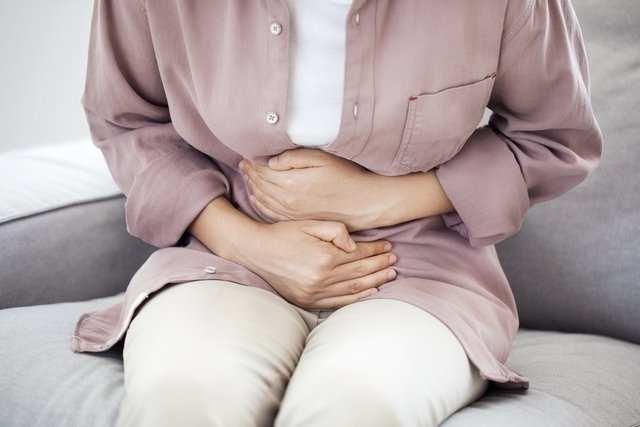To get rid of stomach pain, one of the recommendations is to take medications such as omeprazole or aluminum hydroxide that will improve abdominal discomfort. Additionally, drinking some homemade teas, such as dandelion or mint, and maintaining a balanced diet, avoiding fatty and fried foods, processed meats and soft drinks, also helps to get rid of stomach pain.
Other symptoms, such as gas, burning and a feeling of fullness can accompany stomach pain, the main causes of which are reflux, food intolerance, poor digestion, gastritis or gastroenteritis. Stomach pain can also occur due to the use of certain medications, such as antibiotics or anti-inflammatories, or caused by more serious problems, such as ulcers or cancer. Discover the main causes of stomach pain.
If stomach pain persists or is accompanied by other symptoms, such as recurrent vomiting, unexplained weight loss, dizziness or fainting, it is important to consult a gastroenterologist who may request tests to investigate possible causes and indicate appropriate treatment. .
Home remedies
Some home remedies that can help with the treatment recommended by your doctor, relieving pain, discomfort, heartburn and the feeling of bloating are:
- Fennel tea: Fennel has analgesic and antidyspeptic effects, so drinking 2 cups of this tea a day helps treat poor digestion, gastritis and abdominal bloating. See the benefits of fennel tea and how to prepare it;
- Raw Potato Juice: Consuming grated, squeezed and strained raw potato juice helps neutralize stomach acids, preventing stomach pain;
- Turmeric Tea: Taking 2 to 3 cups of turmeric tea a day helps relieve symptoms of gas, poor digestion and bloating, as the root has anti-inflammatory and antioxidant properties. See how to make turmeric tea;
- Espinheira-santa tea: Espinheira santa is an herb rich in antioxidants that help protect the stomach wall against the action of acids. Drinking 3 cups of tea a day helps combat pain caused by gastritis or reflux. Find out how to prepare espinheira santa tea.
Another homemade and natural option that can help treat stomach pain is to drink 2 to 3 cups of boldo tea per day, as the plant is rich in antioxidants and anti-inflammatories that combat pain and improve digestion. Understand more and see how to prepare boldo tea.
Pharmacy remedies
If stomach pain persists or is accompanied by vomiting, fainting or dizziness, it is important to consult a gastroenterologist, who may prescribe one or more of the following medications, advising the dosage and treatment time according to the symptoms and the problem at hand. treated:
- Analgesics: Medicines such as aspirin, dipyrone or paracetamol are analgesics that act on the central nervous system, indicated to improve stomach pain;
- Gastric protectors: Sucralfate or bismuth salts are gastric protectors that form a barrier, preventing stomach acid from damaging the wall of the stomach and esophagus, preventing stomach pain;
- Antacids: Some antacids, magnesium hydroxide, calcium carbonate, sodium bicarbonate, or magnesium hydroxide neutralize stomach acidity, treating pain, which is common in gastritis, reflux and ulcers;
- Acid production inhibitors: Pantoprazole, lansoprazole and omeprazole are medications that reduce the production of acids in the stomach, relieving symptoms such as pain and discomfort in cases of ulcers, reflux, or gastritis. Cimetidine inhibits acid production, reducing stomach pain.
In addition to these, some antibiotics, such as clarithromycin, amoxicillin and metronidazole, fight the bacteria responsible for inflammation, and can also be prescribed to improve stomach pain caused by problems such as gastritis, ulcers or intestinal infections. Discover other remedies used to combat stomach pain.
How to cure stomach pain
Stomach pain can have different causes, which may be related to diet or an illness, but it can also be due to emotional causes, such as anxiety or stress, for example.
In general, to cure stomach pain, it is recommended:
- Avoid eating fatty foods, such as fried foods, snacks or ice cream;
- Do not drink alcoholic beverages, like wine or beer;
- Avoid drinking soft drinks;
- Avoid sweets, such as ice creams, cakes, candies, chocolates;
- Do not smoke;
- Prioritize the consumption of healthy foodssuch as fresh fruit, whole grains, salad, fresh vegetables, legumes and lean meats;
- Avoid stress and anxiety;
- Practice physical activity regularly.
These lifestyle changes are essential to reduce stomach acidity, which is one of the factors responsible for stomach pain. Know what to eat and what to avoid when you have stomach pain.
Bibliography
- GYAWALI, C, Prakash; FASS, Ronnie. Management of Gastroesophageal Reflux Disease. Gastroenterology. Vol.154. 2.ed; 302-318, 2018
- OPEN UNIVERSITY OF SUS. Diseases of the Esophagus and Stomach. Available at: <http://production.latec.ufms.br/new_pmm/u3a1.html>. Accessed on Aug 19, 2021
- NATESAN, Sreeja et al. Evidence-Based Medicine Approach to Abdominal Pain. Emergency Medicine Clinics of North America . Vol.34. 2.ed; 165-190, 2016
- NATIONAL HEALTH SURVEILLANCE AGENCY – ANVISA. Phytotherapeutic form: Brazilian pharmacopoeia 2nd edition. 2021. Available at: <https://www.gov.br/anvisa/pt-br/assuntos/farmacopeia/formulario-fitoterapico/arquivos/2021-fffb2-final-c-capa2.pdf>. Accessed on Aug 19, 2021
- BRAZILIAN FEDERATION OF GASTROENTEROLOGY. Gastroesophageal Reflux: Diagnosis and Treatment. 2003. Available at: <https://diretrizes.amb.org.br/_BibliotecaAntiga/relux-gastroesofagico-diagnostico-e-tratamento.pdf >. Accessed on Aug 19, 2021

Sign up for our newsletter and stay up to date with exclusive news
that can transform your routine!
Warning: Undefined array key "title" in /home/storelat/public_html/wp-content/plugins/link-whisper-premium/templates/frontend/related-posts.php on line 12
Warning: Undefined array key "title_tag" in /home/storelat/public_html/wp-content/plugins/link-whisper-premium/templates/frontend/related-posts.php on line 13




